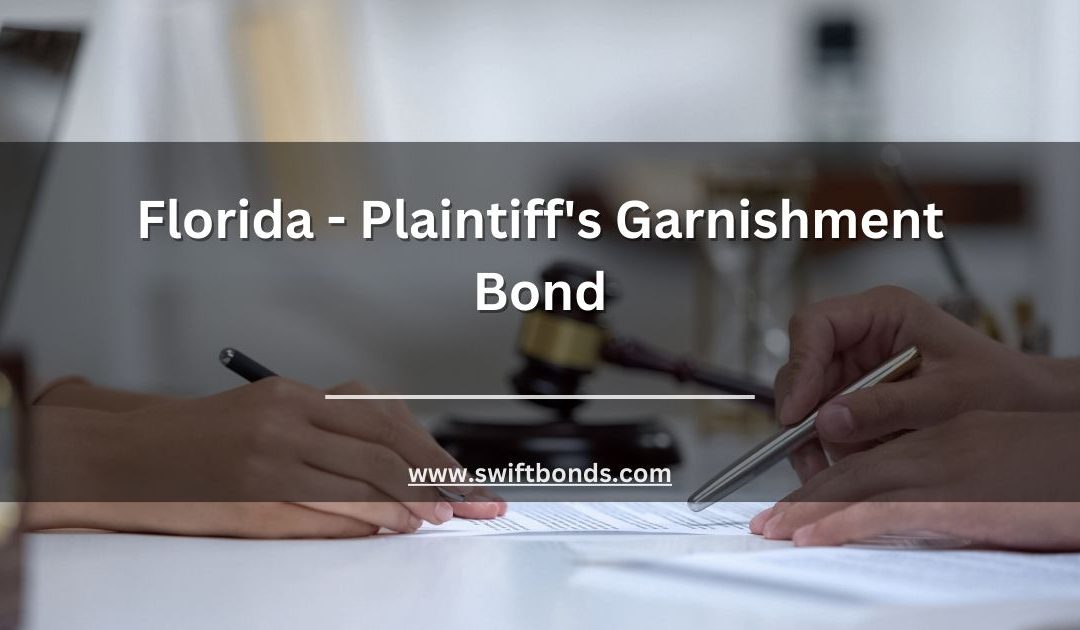Introduction
From our perspective, securing a Florida – Plaintiff’s Garnishment Bond is an important step for plaintiffs seeking to garnish a defendant’s assets before a final court ruling. This bond acts as financial security, ensuring that if the garnishment is later found to be unjustified, the defendant has a means of compensation for any wrongful financial harm.
The legal system requires these bonds to protect defendants from premature asset seizures that could create undue hardship. Without this safeguard, wrongful garnishments could disrupt businesses and individuals financially.
For plaintiffs already dealing with other legal bonding requirements, such as the South Florida Water Management District – Right of Way (Corporation) Bond, understanding the role of a garnishment bond can help avoid legal obstacles.

Common Challenges in Securing a Plaintiff’s Garnishment Bond
We’ve noticed that many plaintiffs and attorneys encounter confusion regarding the necessity and function of a Florida – Plaintiff’s Garnishment Bond. Some common challenges include:
- Understanding the legal obligation – Some plaintiffs assume they can request a garnishment without financial backing, which is incorrect.
- Confusion about bond amounts – The court often determines the bond amount based on the value of the assets being garnished, which may vary case by case.
- Concerns about financial risk – Plaintiffs may worry about the costs of securing a bond, not realizing that premiums are typically a fraction of the bond amount.
Without the required bond, courts may reject garnishment requests, delaying financial recovery for plaintiffs.
Steps to Secure a Plaintiff’s Garnishment Bond
Based on our experience, obtaining a Florida – Plaintiff’s Garnishment Bond follows a straightforward process when handled properly.
What we’ve discovered is that following these steps can streamline the bonding process:
- Confirm Bond Requirements – The court will specify the required bond amount based on the value of the garnished assets.
- Complete a Bond Application – Plaintiffs must provide details on the case, garnishment amount, and financial information.
- Obtain a Quote – The bond premium is calculated based on financial risk factors.
- Purchase the Bond – Once approved, the plaintiff submits the bond to the court before proceeding with garnishment.
- Maintain Compliance – If the case changes or the garnishment is overturned, the bond must be handled accordingly.
For plaintiffs managing multiple bonding obligations, securing a Florida – Solid Waste Facility Financial Guarantee (Corrective Action) Bond alongside a garnishment bond requires attention to different regulatory requirements.

Advantages of a Plaintiff’s Garnishment Bond
We’ve found that securing a Florida – Plaintiff’s Garnishment Bond provides significant benefits:
- Court approval for asset garnishment – The bond allows plaintiffs to proceed with garnishment requests legally.
- Financial protection for defendants – Ensures wrongful garnishments do not cause irreparable harm.
- Credibility in legal proceedings – Courts view bonded plaintiffs as financially responsible, increasing trust in their claims.
For businesses pursuing legal claims while maintaining compliance with other regulations, obtaining additional bonds like the South Florida Water Management District – Right of Way (Corporation) Bond helps streamline financial obligations.

Legal and Financial Risks of Proceeding Without a Bond
In our observation, failing to secure a required Florida – Plaintiff’s Garnishment Bond can lead to:
- Case delays or dismissals – Without the bond, courts may deny the garnishment request.
- Potential legal consequences – If a wrongful garnishment occurs, the plaintiff may face legal and financial penalties.
- Harm to business reputation – Without proper bonding, a plaintiff may be viewed as unreliable in legal and financial dealings.
A garnishment bond is not just a legal formality—it is an important measure to protect both parties in financial disputes.
Choosing the Right Bond Provider
We’ve learned that working with a trusted bond provider ensures a seamless experience. Swiftbonds offers:
- Quick approvals and competitive rates
- Expert guidance for plaintiffs and legal professionals
- Custom solutions for plaintiffs needing multiple bonds
For those needing a Florida – Solid Waste Facility Financial Guarantee (Corrective Action) Bond in addition to a garnishment bond, a reliable bond provider simplifies the process.

Conclusion
We’ve come to appreciate that a Florida – Plaintiff’s Garnishment Bond is an important tool for plaintiffs seeking legal financial recovery. It ensures compliance, protects defendants from wrongful garnishment, and facilitates court approval for asset seizure.
By working with an experienced bond provider, plaintiffs can avoid delays, meet court requirements, and focus on their legal strategy without unnecessary financial risks. Whether securing a South Florida Water Management District – Right of Way (Corporation) Bond or a Florida – Solid Waste Facility Financial Guarantee (Corrective Action) Bond, Swiftbonds makes the process seamless.
With Swiftbonds, legal professionals and plaintiffs can secure their bond quickly, maintain compliance, and proceed with confidence in financial and legal matters. Contact Swiftbonds today to get started on securing the right bond for any legal or financial requirement.
Frequently Asked Questions
Who Needs a Florida Plaintiff’s Garnishment Bond?
Any plaintiff seeking to garnish a defendant’s assets before a final ruling must obtain this bond as required by the court.
How Much Does the Bond Cost?
The bond amount varies depending on court requirements, but premiums are typically a percentage of the total bond amount.
How Long Does It Take to Get the Bond?
Swiftbonds provides fast processing, with most bonds issued within 24 hours.
Can the Bond Be Refunded If the Case Is Dropped?
Bond premiums are non-refundable, but the bond obligation is released once the case concludes.
Is This Bond Needed for Other Legal Matters?
Yes, plaintiffs may require similar bonds depending on their legal claims and financial activities.


